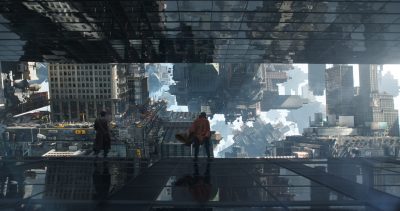
From the death of the sun to the birth of human consciousness, so spans the research of Adam Frank.
Frank is a professor of physics and astronomy at the University of Rochester, where his studies primarily focus on the processes behind the formation and death of stars. A self-described “evangelist of science,” Frank regularly shares his passion for science with others. He has authored three books and is a contributor to The New York Times and NPR.
Most recently, Frank served as the scientific consultant on Marvel’s “Doctor Strange.” The film, which is released Friday, features Benedict Cumberbatch in the title role and brings the Sorcerer Supreme from the pages of Marvel comics to the big screen.
Although the Marvel cinematic universe has already seen its fair share of aliens and gods, “Doctor Strange” is the studio’s first plunge into the world of magic and sorcery.
Not only does the film draw on established scientific theories such as the multiverse, but it also delves into the realm of philosophy and asks questions regarding consciousness and reality. This is where Frank’s work on the film is most prominent, the researcher said in an interview with The Daily Free Press.
“I have an interest in what I would call the human spiritual endeavor,” Frank said. “The open question here is a philosophical question, not necessarily a scientific one.”
That “philosophical question” is one of the nature of consciousness, what Frank and others in the philosophy field refer to as the mind-body problem, which is interested in defining the relationship between the mind (the experiential nature of human life) and the body (matter that is controlled by physics).
One prevailing point of view on this question is a theory known as reductionism. The reductionist view suggests that consciousness and one’s experience of the world is nothing but the activity of the brain’s neurons.
Reductionists maintain that everything can be broken down into the parts that make it work. Therefore, quarks, atoms and neurons can be built back up to explain the occurrence of consciousness. Frank, however, is a non-reductionist.
“There is more that can happen at the higher levels of organizations in the world than can be encoded in the atoms,” he said.
Frank cited the work of philosopher David Chalmers, who brought to light inherent problems with attempting to define consciousness as a natural, materialistic phenomenon.
Frank’s knowledge of this mind-body problem made up the bulk of his contributions to “Doctor Strange.” He described a day when he and the writer, producer and director of the film got together and simply talked about philosophy of the mind for an entire day.
“What I wanted to do in our discussions was ground Doctor Strange’s powers in the open question about consciousness,” Frank said. “The fact that there isn’t a scientific theory for that means it’s a place you can put him, and that could be where the source of his powers emanate from.”
This open, theoretical realm is where science fiction narratives thrive. Frank, a fan of both comics and science fiction, said he believes science in film doesn’t always have to be exact. He cites the “Star Trek” films as an example. The technology displayed in those films is so theoretical that checking its accuracy is pointless.
“People go to movies because they want good stories,” Frank said. He argues that what matters the most in science fiction is the world and universe building. “You give yourself a coherent and consistent set of rules … and you live within that.”
The best science fiction considers real-world possibilities, Frank maintains.
“Good science fiction not only educates the public, but it actually helps create the universes that we end up living in,” Frank said. He outlined examples such as the novelist William Gibson coining the word “cyberspace” before it entered modern scientific vocabulary.
Frank said he believes firsthand in the power of narrative and science fiction’s effect on actual scientific research. He described how the covers of his father’s pulp science fiction magazines, featuring men bouncing from planet to planet, fueled his love for science and inspired him to become an astrophysicist.
“Doctor Strange” could possibly have the same effect on another generation of scientists, Frank said. These scientists could continue researching and answering the questions, like those concerning consciousness, that currently appear to have no concrete answer.
“Sometimes these movies can go beyond just being superhero movies,” he said. “I think ‘Doctor Strange’ has the possibility of getting people to think about … the maps we use to represent the world and where those maps are partially incomplete.”



























































































































